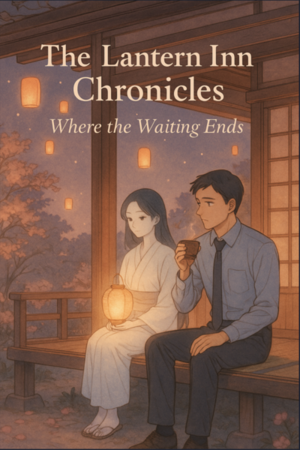Chapter 11:
The Lantern That Wouldn’t Go Out
Lantern Inn Chronicles
Some lights fade when it's time. Others wait for a hand to hold them steady.
At the very end of the inn’s west wing — where even the wind seemed to forget to visit — stood a single door marked Room Eight. And above that door, hanging from a crooked iron hook, was a lantern.
It wasn’t brighter than the others.
Nor was it the oldest.
But it was the only one that never went out.
Since the day Kaito arrived at the Lantern Inn, that solitary flame had burned — unwavering, pale, and stubborn. Every dusk, he made his rounds with the brass lighter and kindling oil. He lit each lantern by hand, watching them blink to life one by one like sleeping stars reluctantly stirring. Some flickered before catching flame. Some needed coaxing.
But Room Eight?
It was always already lit.
As if the soul inside had refused to be forgotten.
Kaito had grown used to it. Mostly. But some nights, when the air grew too still and the memories pressed in from behind the walls, he would find himself at that far corner — standing before the sealed door with a cup of tea in hand and questions he dared not speak.
The registry simply read:
Name: Reika
Status: Occupied
No family name.
No date of arrival.
No expected departure.
The ink was aged — almost rubbed smooth — like time itself had hesitated to record her fully.
No one had seen her.
No one spoke of her.
But the room stayed locked. And the lantern kept glowing.
It began on a night colder than the others.
A wind had risen from the mountains — sharp and wild — howling down the corridors like a child forgotten at a train station. Windows rattled in their frames. Shutters groaned. The inn’s wooden bones creaked like old knees in prayer.
Kaito stood before Room Eight, cradling a small ceramic cup — steam curling gently from it like a thread of incense. Jasmine tea, with just a hint of apricot — the same blend he often brought to quiet souls.
He raised his hand.
And knocked.
Once.
Twice.
He didn’t expect anything. Not really. Maybe a shift in air pressure. A sigh of wood.
But then — a faint creak.
The door didn’t open fully. Just a sliver. Barely wide enough for the eye to wonder.
And from the gap emerged… presence.
Not form. Not voice. Just a sensation — the quiet awareness of being watched.
A single pale eye, nearly silver in the moonlight, peered through long, uncut black bangs. Her skin — what little he could see — was moon-pale, nearly translucent, as though she'd been carved from the very dust of forgotten years.
The scent that spilled from the room was faint, but distinct:
Old paper.
Dried lavender.
Dust that had long forgotten the feel of sunlight.
And then, a voice — dry, soft, and barely tethered to the world:
“You shouldn’t be here.”
Kaito bowed, a silent gesture of respect. His hands held the tea steady.
“No one ever should be. But we are.”
A silence followed — not empty, but watchful. Like the stillness of old libraries or the moments between thunder and rainfall.
Then the door clicked shut.
Softly.
Finally.
He placed the tea on the floor, outside the door. And turned away.
The next morning, the cup was empty.
Not cracked.
Not broken.
Wiped clean.
From that moment, a ritual was born.
Each night, he brought her tea.
Each night, he knocked.
Each night, the door opened just a little. Sometimes she spoke. Sometimes not.
And each morning, the cup was empty — always accompanied by a faint trace of cherry blossoms in the air, even though the season had long passed.
He never told the others.
There was something sacred about it.
A rhythm, gentle and deliberate — like the first strokes of calligraphy on handmade paper.
A bridge forming not out of words, but mutual silence.
Weeks passed.
Sometimes they exchanged only glances.
Sometimes, breaths.
But on one particular night — the kind where the stars seemed to hide behind their own memories — as Kaito placed the tea down, her voice came clearer than before.
Still low. Still unsure.
But less afraid.
“Do you think… people choose to stay in sadness?”
Kaito stood there for a long moment, letting the question settle like mist on the floorboards.
Then he replied.
“Sometimes… it feels safer than being forgotten again.”
Another pause.
Then — slowly — the door opened wider than ever before.
Reika stepped into the moonlight.
And time, for a moment, held its breath.
She was delicate — not weak — but like a petal that had refused to fall. Her white yukata was faded and threadbare at the edges, its once-smooth fabric now weathered like an old promise. Her hair, long and straight, flowed down past her waist. Her presence shimmered — not ghostly, but untethered, like memory learning to breathe again.
“My name is Reika,” she said, voice like wind across rice paper.
“I waited for someone… who never came back.”
She didn’t cry. Didn’t flinch.
Kaito didn’t ask who.
But she told him anyway.
“He was a calligrapher. Gentle hands. Eyes that spoke in silence. He wrote me poems hidden in the strokes of kanji — love tucked between brushstrokes.”
“When war came, he promised he would return. He gave me a ribbon… the kind used to bind his scrolls.”
“I wore it. Every day. I still do.”
“But he never came.”
“So I stayed. In case he did.”
She looked down, as if seeing the years gather like dust at her feet.
Kaito bowed his head.
“Then let me wait with you.”
And from then on, their silence turned into conversation.
Not always long. Not always easy.
But real.
She told him about mornings spent by a window that faced the wrong road. About how she wrote letters with no one to send them to. How she tucked those letters inside her sleeves, hoping someday… somehow… he might return and read them.
And how eventually, she stopped writing.
Stopped counting years.
Stopped opening the curtains.
“Moving on felt like betrayal,” she whispered one evening.
“So I stayed. I stayed so long, I forgot how to leave.”
Then — one night — the sky broke open.
Rain lashed the inn like a broken violin string. Thunder growled deep in the earth.
And the lantern outside Room Eight flickered.
For the first time in decades — it danced.
Inside, Reika whispered:
“I think… I’m ready.”
Kaito said nothing.
He simply waited.
But she didn’t leave.
Not that night.
Not the next morning.
Instead — she stepped out.
Not in disappearance. But in presence.
She wore the ribbon — deep navy, soft from age — tied gently at her neck.
“He’s not coming,” she said.
Then looked at Kaito.
“But someone did.”
Her fingers brushed his sleeve — soft, cold, steady.
“Thank you. Not for trying to fix me. Just… for waiting.”
That night, the lantern outside Room Eight glowed warmer.
Not because Reika had moved on.
But because she had chosen to stay.
Not out of sorrow.
But out of purpose.
Flashback: Kaito, Age 24.
Hospitals during COVID felt like purgatory — silent, sanitized, and full of people waiting for goodbyes they weren’t allowed to say.
Kaito had sat by the window of the isolation ward, watching his mentor, Tanaka-san, breathe through a tube, unable to speak.
They weren’t allowed to enter. To touch. To talk.
So he brought a notebook. Held it to the glass.
“I’m still listening,” it read.
Tanaka smiled. Reached under his pillow and raised a notebook of his own:
“Then live for me too.”
Kaito didn’t cry then.
But later — in the hospital restroom, fists clenched over a sink too white — he crumbled.
He had never cried like that before. Never since.
But the words stayed.
Back at the inn, Kaito opened the registry again.
And wrote something new.
A fresh nameplate.
Reika – Resident
Staff
When she saw it, she blinked in surprise. Then chuckled softly — the sound like wind chimes brushing against spring air.
“Do ghosts get jobs now?”
Kaito smiled.
“Only if they want to keep lighting the way.”
She touched the nameplate gently, as if it were fragile calligraphy.
“Then I’ll stay. Just a little longer. There might be others… still waiting.”
And for the first time, the hallway outside Room Eight felt alive.
Not haunted.
Not hollow.
But alive — like the inn had gained a new heartbeat.
A quiet, steady flame that refused to go out.




Please sign in to leave a comment.